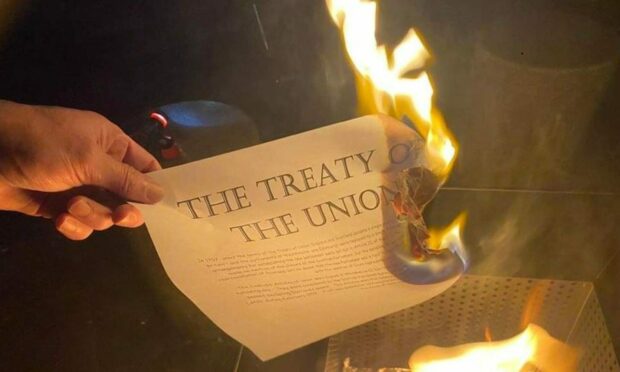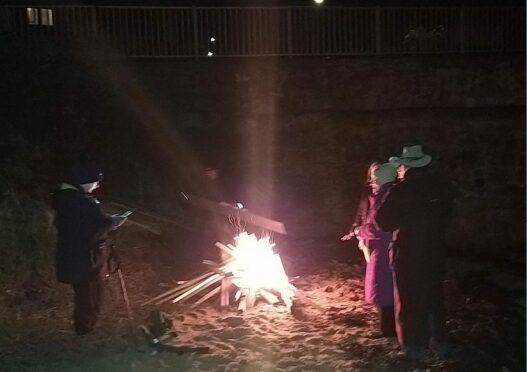A pro-independence group has been slammed for encouraging people to burn copies of the Act of Union and for referring to the UK as Scotland’s “colonial oppressor”.
Just after midnight on November 5 a number of bonfires were lit across Scotland, including in Inverness, Nairn and Aberdeen, and people were encouraged to burn copies of the 315-year-old treaty and “all symbols of colonial oppression in Scotland”.
However the stunt, organised by a group called Salvo, has been heavily criticised and dubbed “incredibly stupid and irresponsible”.
SNP MP Pete Wishart said it is “sinister” to be burning copies of a legal act and said it is “counterproductive” to the wider independence movement.
Burn all ‘symbols of colonial oppression’
The stunt was called ‘bonfire of the vanities’ and saw nine fires lit across Scotland, including in Aberdeen, Inverness, Nairn, Kirkcaldy, Kinghorn, Glasgow and Kilmarnock.
Supporters were also encouraged to hold their own private “burnings” and link up to the one of the main events over Zoom.
The term ‘bonfire of the vanities’ comes from a series of events that took place in Florence, Italy in the 1490s when a Dominican friar encouraged his followers to burn anything considered a “luxury”, including books, manuscripts and works of art.
Sara Salyers, who attended one of these bonfires, posted on social media to say she was planning to “burn the (Treaty of) Union and all the symbols trappings of colonial oppression in Scotland”.
Bonfire of the Vanities on a Fife beach. Getting ready to burn the (Treaty of) Union and all the symbols trappings of colonial oppression in Scotland. They go up at midnight – November the 5th. pic.twitter.com/XinyEQCk8f
— Sara Salyers (@SSalyers2) November 4, 2022
The Treaty of Union was signed in 1707 and officially brought England and Scotland together under one state.
This act replaced the English Parliament in Westminster and the Scottish Parliament in Edinburgh with one single parliament of Great Britain.
‘Incredibly irresponsible’
The stunt has been condemned by Pete Wishart, MP for Perth and North Perthshire, who urged the group to “stop this incredible nonsense”.
Speaking to The Courier he said: “I have never seen anything like it.
“It is sinister and there is no democratic debate for burning anything like that.
“It is incredibly irresponsible.
“This was done in the name of colonial oppression and the people of Scotland don’t believe they are colonised, they would think you are mad or just laugh at that.”
Geez..! Can I please appeal to the people on the fringe of the independence movement to just stop this. Apparently this is some sort of protest about colonial oppression’. They seriously don’t know how nuts this looks. This does not help. https://t.co/A3gG1RaBLa
— Pete Wishart (@PeteWishart) November 5, 2022
Mr Wishart added acts like this hamper the wider Scottish independence movement.
He said: “We are in the business of winning people over to the cause of independence and mad and crazy stunts like that turn people off in droves.
“We are in a critical position in the debate on independence.
“People are observing the language and the activity we use and when they see stuff like that they think the whole independence movement is nuts and doesn’t talk to their experience.”
He said those who want to campaign for independence should do so by knocking on people’s doors and speaking to them instead.
Group defend bonfire stunt
A spokesperson for Salvo said the plan was for the bonfires to re-enact the “burning of articles of union all over the country in 1707”.
They added they wanted to question the “legality of parliamentary sovereignty as claimed by Westminster” and said at the time “everyone turned a blind eye because it suited them”.


